All products featured are independently chosen by us. However, SoundGuys may receive a commission on orders placed through its retail links. See our ethics statement.
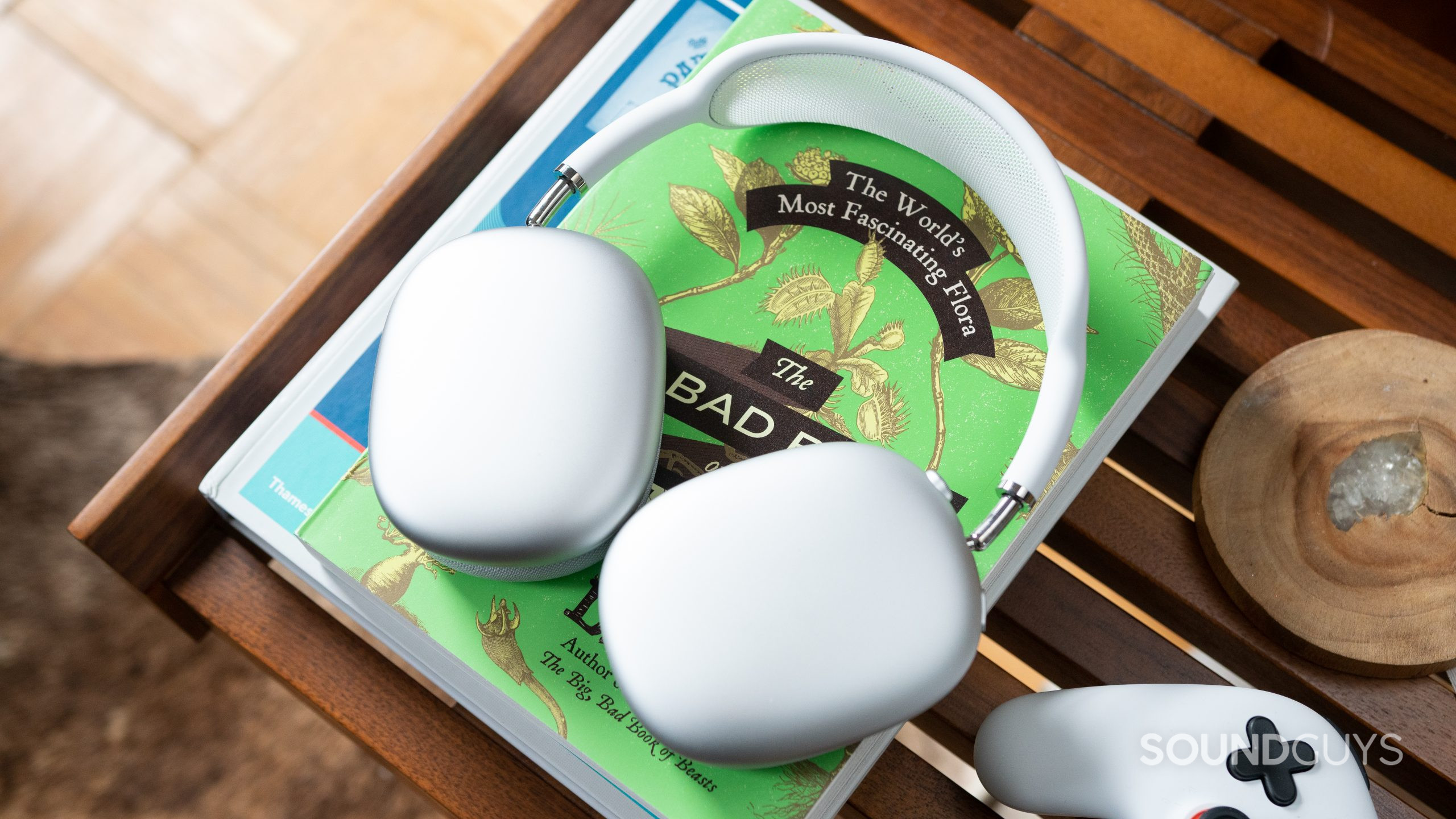


Apple AirPods Max
Ever since acquiring Beats by Dre for an ungodly amount of money in 2014, it’s been obvious Apple has its eye on the consumer audio space. The original AirPods was a hit despite being terrible, and the AirPods Pro is actually among the best true wireless earbuds you can get. So when Apple announced its long-awaited over-ears, the AirPods Max, we were excited but skeptical.
Is this just another overpriced Apple product, or is it actually a good pair of headphones?
Editor’s note: this article was updated on November 20, 2024, to address a re-test of the Apple AirPods Max with the latest firmware, to add an Editor’s Choice award, and to include a new video review.
People in the Apple ecosystem will love the AirPods Max, as well as people who love the AirPods Pro but want over-ears. You can enjoy many of the same software perks as the AirPods in a more comfortable form factor. Anyone who wants one of the best noise canceling headphones should get the AirPods Max.
What is it like to use the Apple AirPods Max?
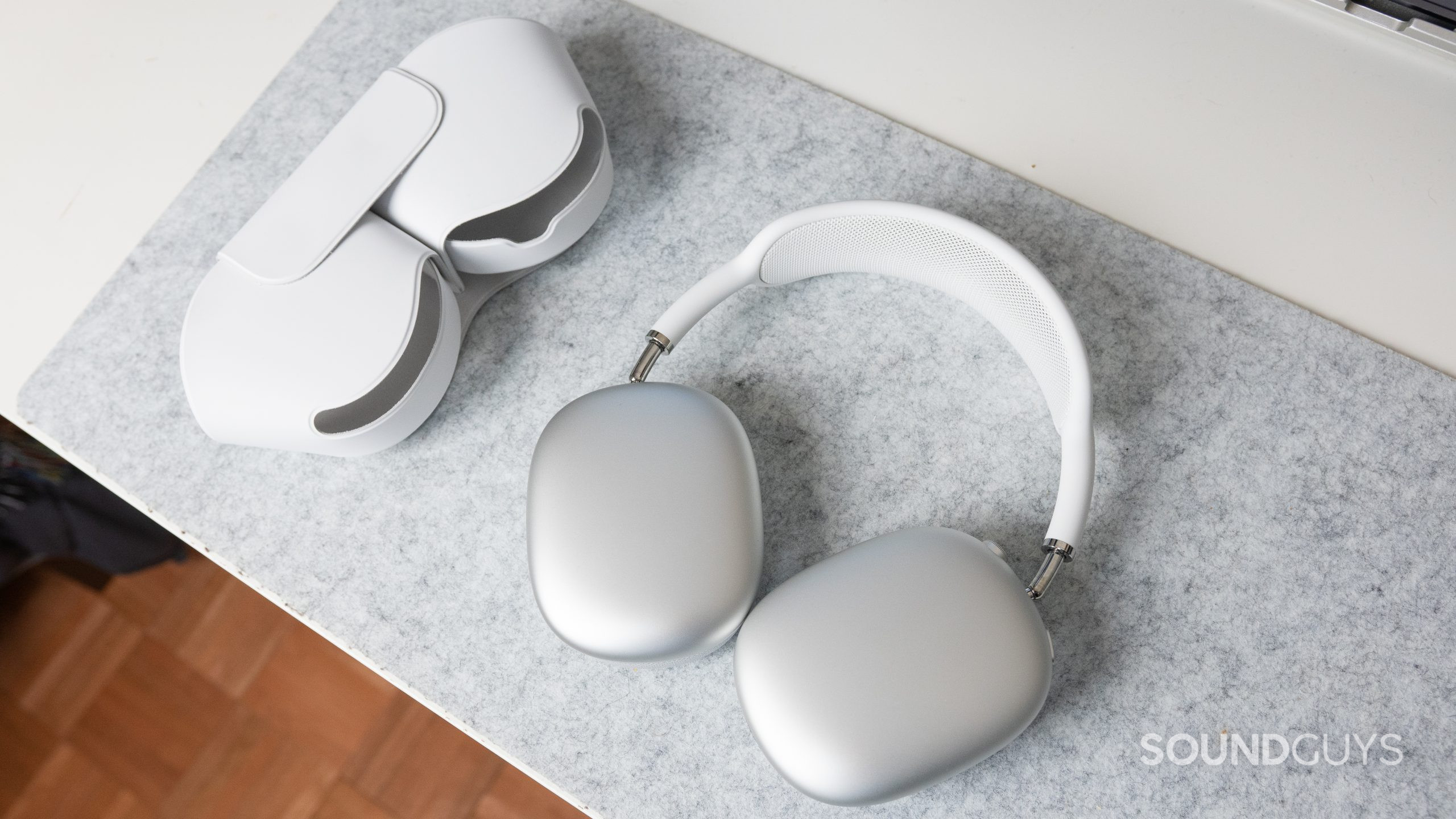
Using the AirPods Max is a mixed bag. This headset is fantastic in particular situations, but any time you want to use the AirPods Max in a way Apple doesn’t intend, things get weird. For example, even just going wired means you need to jump through a few hoops.
The AirPods Max doesn’t have a 3.5mm headphone jack, which makes these headphones less than ideal for audio professionals. That said, as long as you remain in Bluetooth land, you shouldn’t have any problems.
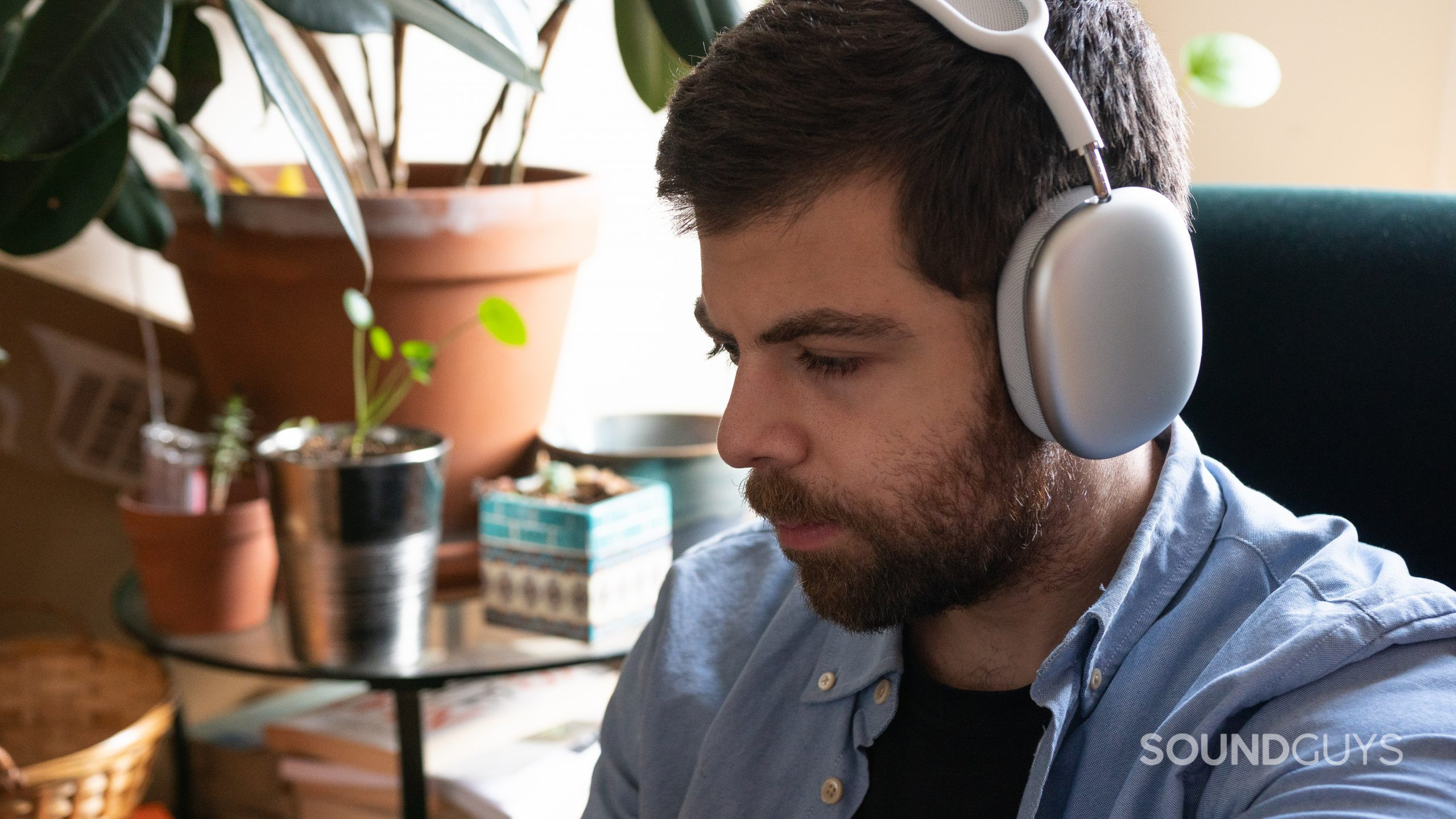
The AirPods Max has top-notch noise canceling and a transparency mode to let you hear what’s going on around you with the click of a button. Volume and playback controls are assigned to the digital crown at the top of the right ear cup, and it is insanely smooth. At times, I find myself accidentally raising or lowering the volume when trying to readjust the headphones. Tiny sensors on the inside of the ear cups also auto-pause playback when you take off the headphones. Resuming playback is as simple as putting the headphones back on.
There is no power button to turn the headset on or off. Instead, it enters a low-power mode when you put it in the case, and it’s ready to go when you take it out again. This is convenient but only useful when you actually use the case. When the AirPods Max isn’t in the case, it remains on for a few hours before going to sleep, draining the battery the entire time.
How are the build quality and design of the AirPods Max?
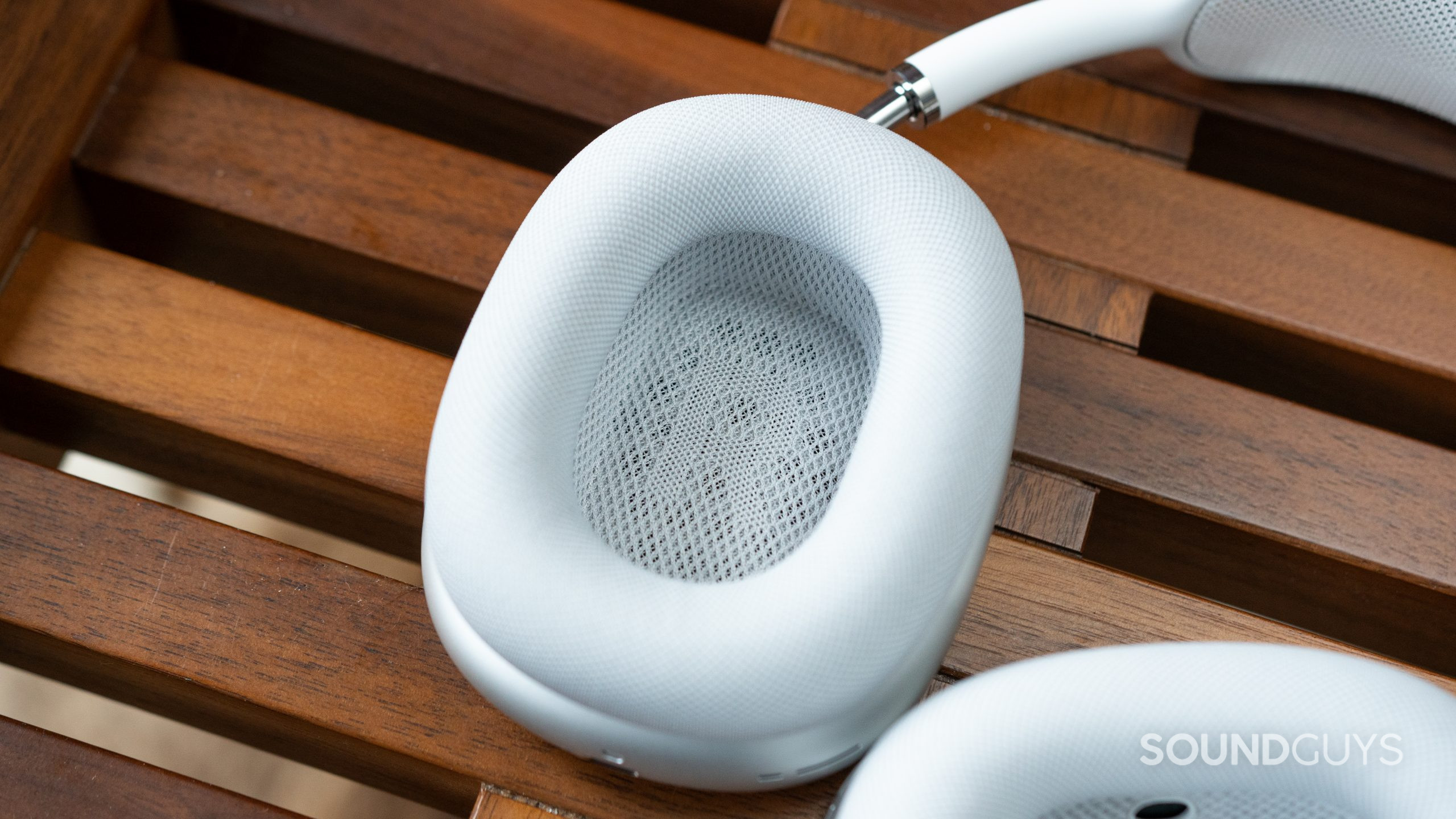
The AirPods Max plays the part of luxury headphones extremely well. The stainless steel headband and aluminum ear cups feel sturdy, and I don’t feel like they’ll break if I toss them in my backpack. All that metal means the AirPods Max is also really heavy, weighing in at 385 grams. That’s much heavier than the other top noise canceling headphones we’ve tested, and you feel it. That’s not to say these aren’t comfortable, though. The headband is brilliantly engineered to distribute the weight evenly.
The plush padding and light fabric headband feel really nice. The ear cups feel amazing—they’re, without a doubt, my favorite thing about the headset. They are comfortable, and you can easily pop off the padding to replace them as needed. This allows you to mix and match colors, though you’ll have to shell out another $69 if you want to go that route.
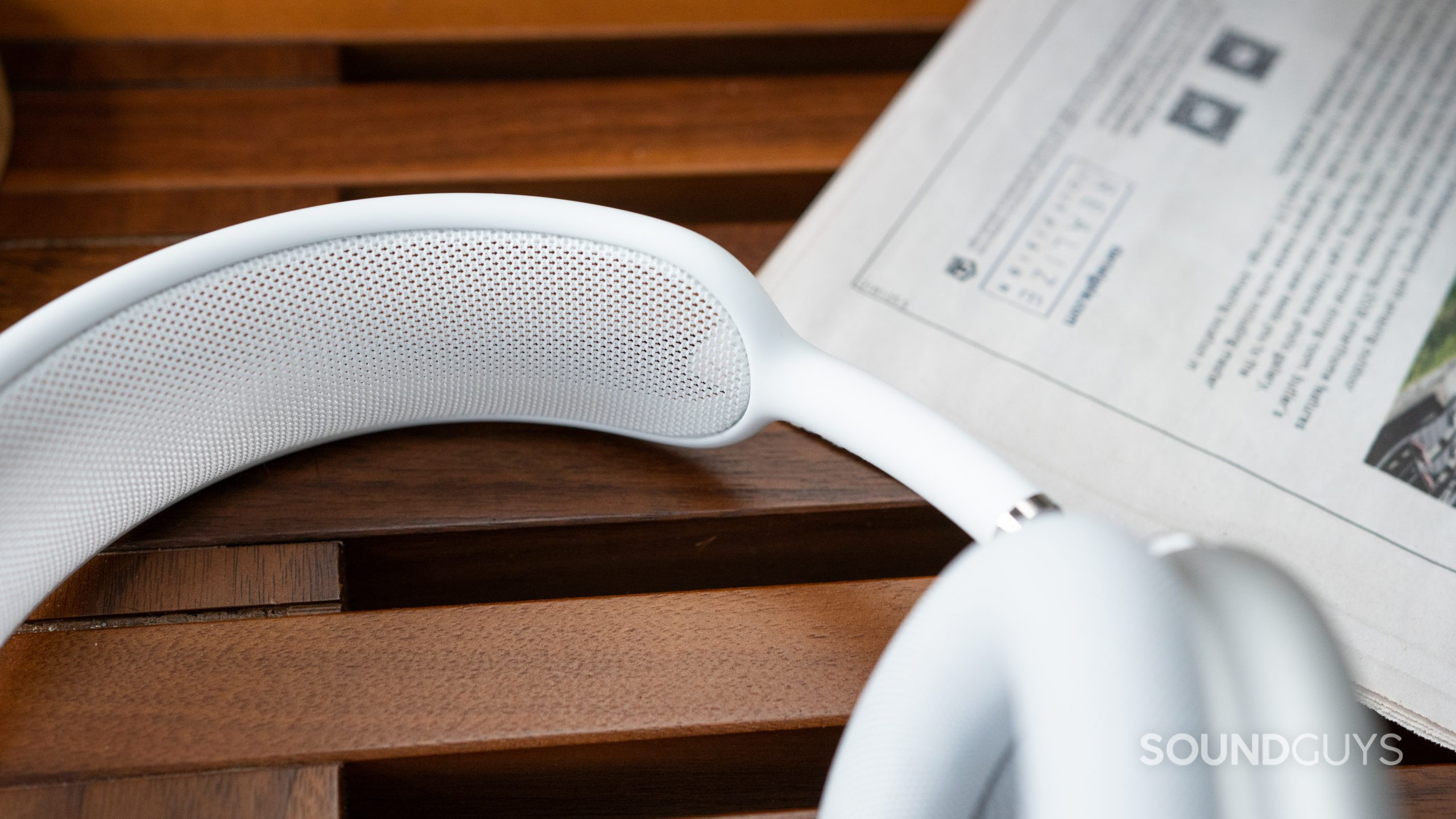
The ear cups are extremely deep, which is actually very important. Providing plenty of room around your ears brings a number of benefits, from effective weight distribution to making noise isolation easier to accomplish. It may seem like a little thing to gush about, but bigger ear cups mean more things go right for more people, which we’ll demonstrate a bit later on.
One notable downside here is the lack of any folding hinges. While the rotating ear cups are nice when you want to slip them into your bag, they don’t fold down like other headphones. The headband is made of metal that slides when adjusting the fit but won’t fold to save space.
The AirPods Max is not waterproof. Unfortunately, it isn’t even water-resistant. If you get caught in a heavy rainstorm, it’s a good idea to take this off and stow it away. To be fair, most high-end headphones are like this, but typical audiophile headphones aren’t made to be used outside of your house. The AirPods Max is made to be portable, so not having any kind of water protection is definitely a miss on Apple’s part. Especially when you consider that the Bose Noise Canceling Headphones 700 has an IPX4 water resistance rating and costs far less.
How do you use the AirPods Max Smart Case?
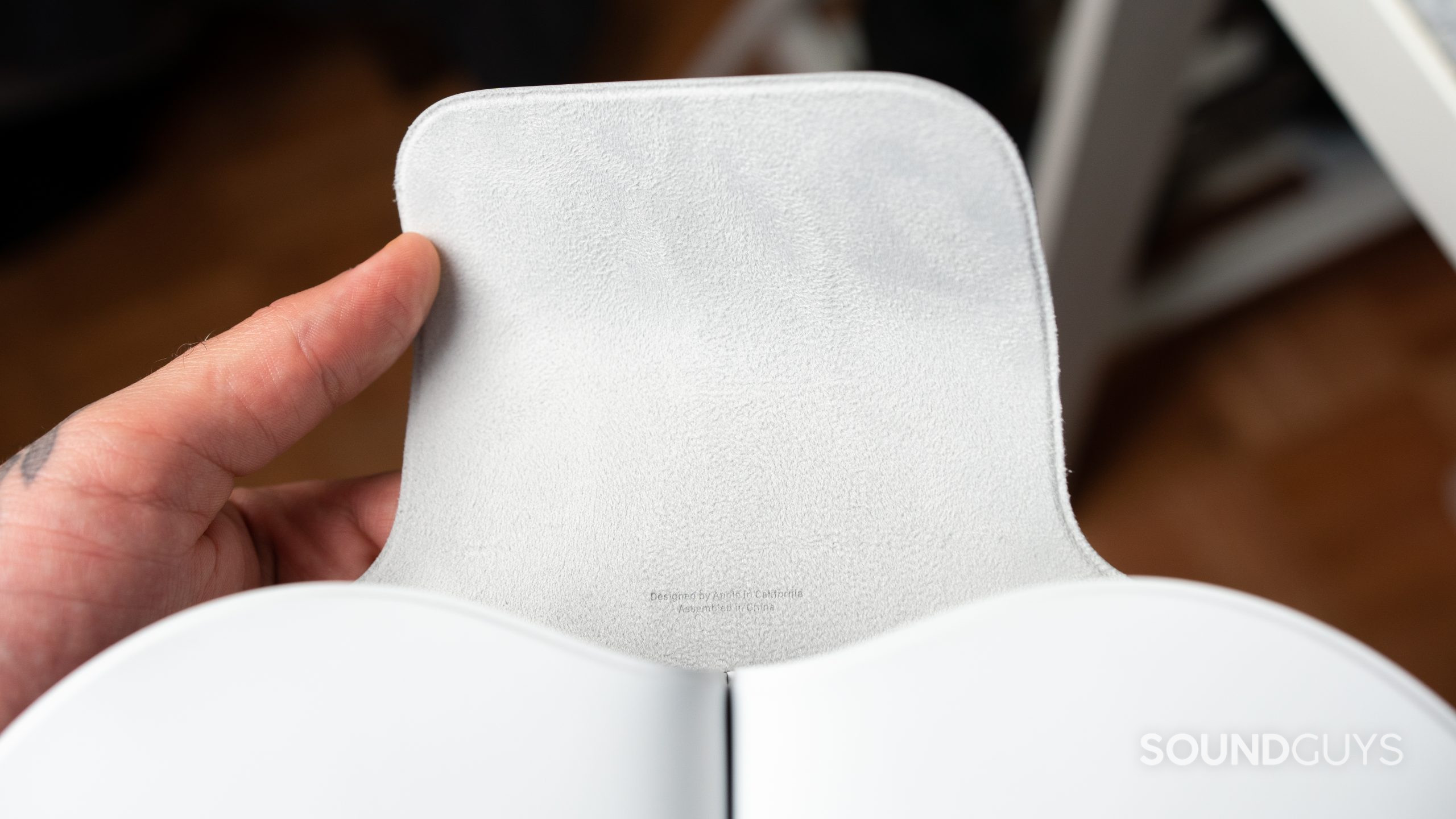
The case that comes with the AirPods Max is basically useless as a case—its main purpose is as an off-switch. Most headphone cases are supposed to protect your investment from serious harm, but not here. This case is more like a skin that protects the metal from minor scratches but is useless in protecting it from anything more. You’re better off buying a third-party case to protect your investment.
While I’m confident that the metal headband won’t bend or break in most situations, I’m not so sure about the soft fabric. Tossing the exposed headband into a bag with just a few pens could potentially result in at least a few unwanted marks if not an accidental puncture. There are just so many little accidents that happen in daily life that this case does not protect against. Where the original AirPods case was a perfectly functional object, this feels more like a swing and a miss.
What Bluetooth codecs does the AirPods Max support?
The connection with the AirPods Max is generally pretty solid, which has to do with the H1 chip. Like the smaller AirPods Pro, this uses Bluetooth 5.0 with the AAC and SBC Bluetooth codecs. A SoundGuys colleague reports occasional glitches when listening to Spotify from an iPhone SE2, as well as some strange behavior where podcast audio isn’t routed to the AirPods Max despite an established Bluetooth connection.
For the unfamiliar, a Bluetooth codec is the method of communication between two Bluetooth devices. All Bluetooth audio devices use the standard SBC codec to transfer sound back and forth. The AirPods Max also uses AAC, which is superior, but it tends to not play well with some Android phones (through no fault of its own). Be aware that if you have an Android phone that supports higher-quality codecs like aptX or LDAC, they’re not going to be of much use here. If you’re on iOS, you have nothing to worry about since iOS devices will default to AAC anyway. Suppose you plan on playing lossless files or using a high-quality streaming service like Qobuz or Deezer. In that case, you won’t be fully taking advantage of the quality those services have to offer because of Bluetooth’s limitations.
How do you connect AirPods Max to iOS devices?

Connecting the AirPods Max to iOS devices is just as easy as with any of the other H1-enabled devices. All that you need to do is hold the headset about two inches away from the device you want to connect to and wait for a card icon to pop up. From there, just hit the “Connect” button, and you’re good to go. The AirPods Max will now automatically connect to all devices on your iCloud account, so you won’t need to redo the process every time.
Will the AirPods Max work with Android or PC?
Yes, you can connect your AirPods to an Android or Apple device! However, you’ll be missing a few smart features. To connect the AirPods Max to Android devices or Windows computers, just follow these steps:
- Remove the headphones from the case, but don’t put them on—Seriously. I found this process doesn’t work at all if the headphones detect you wearing them.
- Hold down the noise canceling button at the top of the right ear cup.
- When the LED at the bottom of the right ear cup begins to blink white, then you know you’re in pairing mode.
- Navigate to the Bluetooth settings of the device you want to pair to and click on the AirPods Max to connect. That’s it!
As I mentioned, you won’t get all of the same features on Android or Windows. For example, the proximity sensors on the inside of the ear cups will not work. This means taking them off won’t auto-pause or automatically resume playback. You also won’t be able to access any virtual assistants on other devices. Long-pressing the digital crown to access a voice assistant only works with Siri, so if your device doesn’t support Siri, then it won’t work.
Does the AirPods Max have Bluetooth multipoint?
Technically, the AirPods Max does not support true Bluetooth multipoint, but it still functions the same way as long as you’re using iOS devices. While you can pair the AirPods Max to multiple devices, it doesn’t switch automatically—you’ve got to manually go into Bluetooth settings to disconnect from one device and reconnect to another. This isn’t a problem if you’re only using Apple products, as the headphones will automatically switch to whichever device is playing audio. If you’re like me and jump between Apple and non-Apple devices, prepare to go through your Bluetooth settings a lot.
What is Apple Spatial Audio?
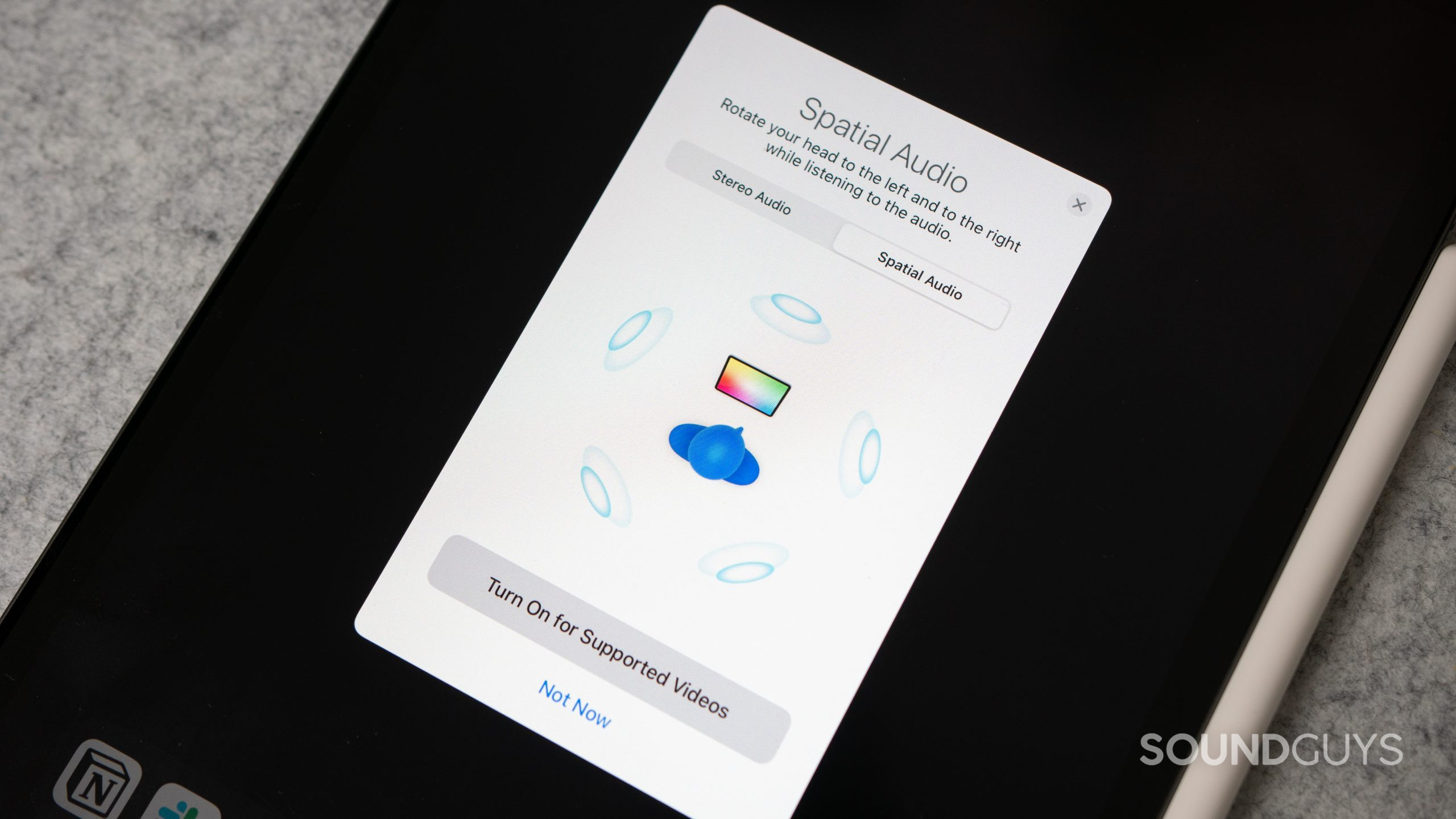
Spatial audio is what Apple calls its surround sound technology. In a typical surround sound speaker system, you have multiple speakers positioned around the listener to give the illusion of space. Software processing can be used to create the same effect in headphones. Sounds get encoded as objects and come through the left and right channels positioned in 3D space, producing a surround sound effect.
The overall effect is really cool and immersive when watching movies or shows that support it. Apple even makes sure the sound seems to be coming from the same place when you move your head. The AirPods Max (and the AirPods Pro) does this by matching the gyroscopes and accelerometers in the headset with the ones in your iPhone or iPad. This tech can then figure out which direction your head is moving relative to the viewing device and adjust the sound accordingly.
Spatial audio is another feature you can’t benefit from if you’re not using an iOS device as your source. Sorry, Android and Windows users.
How long does the AirPods Max battery last?
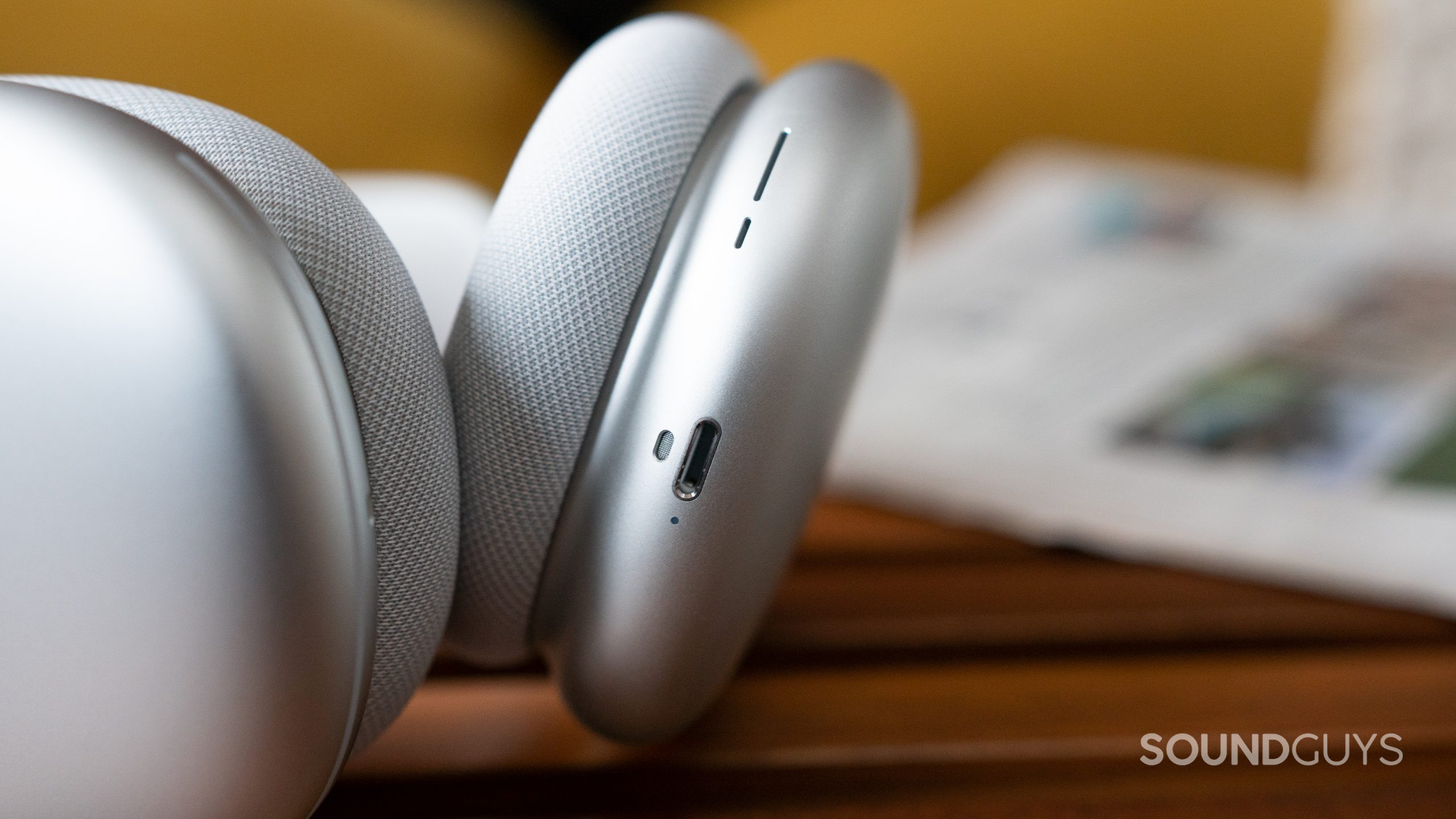
Apple claims the AirPods Max will last you around 20 hours of constant playback with active noise canceling turned on. With our standard test of continuous music playback peaking at 75dB(SPL), we found that we actually got closer to 21 hours using either an iPhone or an Android device or just over 21 hours with ANC disabled. The headphones do a great job at sipping battery in my time with them, which is just as well, considering you can’t physically turn them off! Of course, we’ll always lambaste a set of headphones that chooses to waste power, especially when you consider that it’s so bad for the longevity of tech. You can’t replace the batteries in the AirPods Max easily, so be sure to take care of them as best you can.
Putting the AirPods Max in the case activates a low-power mode, and it will wait for a few hours before powering off automatically if you leave it out. I feel like this is a little too long, and I wouldn’t be surprised to see Apple push an update that shortens this time in the future.
Up until 2024, the AirPods Max were sold with a Lightning charging cable. As of September 9, 2024, you can now buy AirPods Max with USB-C charging (Apple had to make this switch to comply with EU regulations). Make sure you check carefully before purchasing the AirPods Max to ensure you get the USB-C model, which is more future-proof.
How well does the AirPods Max cancel noise?
Loading chart ...
The active noise canceling on the AirPods Max is fantastic. This is important because the better your headphones are at preventing outside noise from reaching your ear, the better the chances are that your headphones will sound as good as they can. Wearing the AirPods Max while sitting at my desk completely blocks out the hiss from my heat turning on, as well as almost every other sound. The music my roommate plays in her room during the workday becomes barely audible, and even typing on the keyboard is significantly quieter.
One annoying thing about the noise canceling: you can’t turn it off unless you have an iOS device. By default, the button on the headphones toggles between transparency mode and active noise canceling mode. With an iOS device, this behavior can be modified, with neither ANC nor transparency available as an option.
The AirPods Max also has the best transparency mode around. This feature uses external microphones to amplify external sounds in the useful voice band instead of canceling them out. Instead of lowering the volume of your music so you can hear what’s going on, it amplifies the microphones to match what you’re listening to. This means you’ll never feel like you’re missing out on your favorite part of a song while trying to be more aware of what is happening around you.
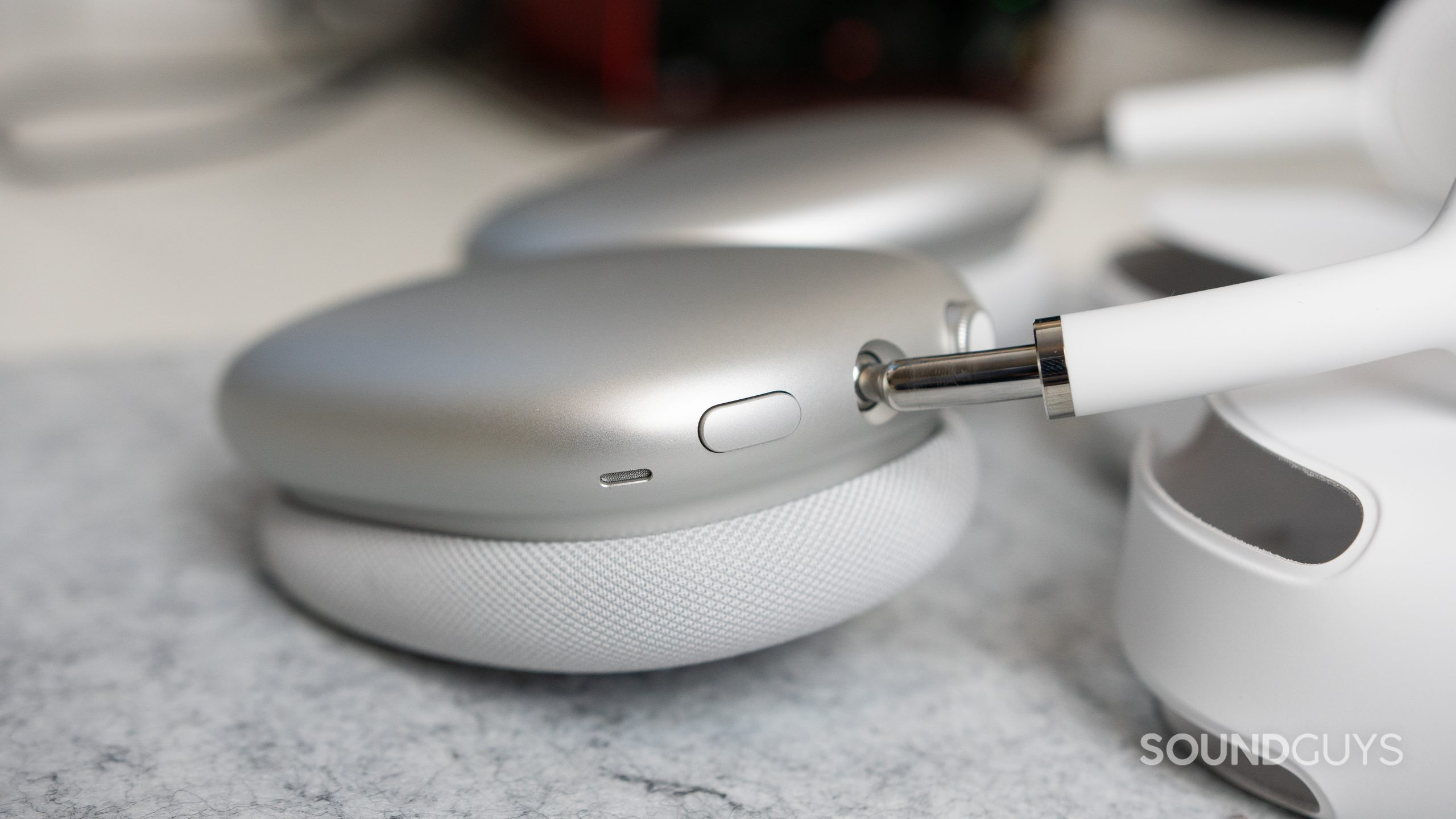
Looking at the results of our isolation tests shows just how impressive this headphone’s ANC really is. To learn exactly how to read our charts, make sure to check out our full explainer, but the short version you need to know right now is the higher the dashed, blue trace gets on the chart, the better the noise canceling. The solid pink line represents just the passive isolation (how well these block outside noise with active noise canceling turned off).
Most over-ear headphones do fairly well at blocking noise in the mid to high frequencies, which are anywhere to the right of the 1000Hz mark, but great noise canceling headphones block sounds below that. This is where you’ll find sounds like airplane cabin noise or the hum of an air conditioner. It’s also where other headphones like the Bose QuietComfort 45 and the Sony WH-1000XM4 excel, which is why they’re consistently at the top of the list for best noise canceling headphones.
If you compare the AirPods Max to the Sony WH-1000XM4 noise canceling graph, you’ll see that the AirPods Max outperforms Sony’s ANC in this crucial part of the frequency range. Where the Sony WH-1000XM4 noise reduction slopes off below the 70Hz mark, the AirPods Max holds steady, meaning it’s more effective at canceling the lowest frequency noises. While the Sony headset is great, the AirPods Max is just slightly better.
When you compare the AirPods Max to the Bose Noise Canceling Headphones 700, you’ll see more of the same. While the Bose headphones do a decent job between 100 and 1000Hz, they fall a bit short when it comes to sounds below 100Hz. The AirPods Max will block much more sound in this crucial range, which is something to keep in mind if you want to block outside noise.
You can get a full comparison from our Apple AirPods Max vs Bose Noise Canceling Headphones 700 article.
How do the Apple AirPods Max sound?
In short, as far as wireless headphones go, the sound quality of the AirPods Max is great.
Multi-Dimensional Audio Quality Scores (MDAQS)
The chart below shows how the sound of the Apple AirPods Max was assessed by the Multi-Dimensional Audio Quality Score (MDAQS) algorithm from HEAD acoustics.
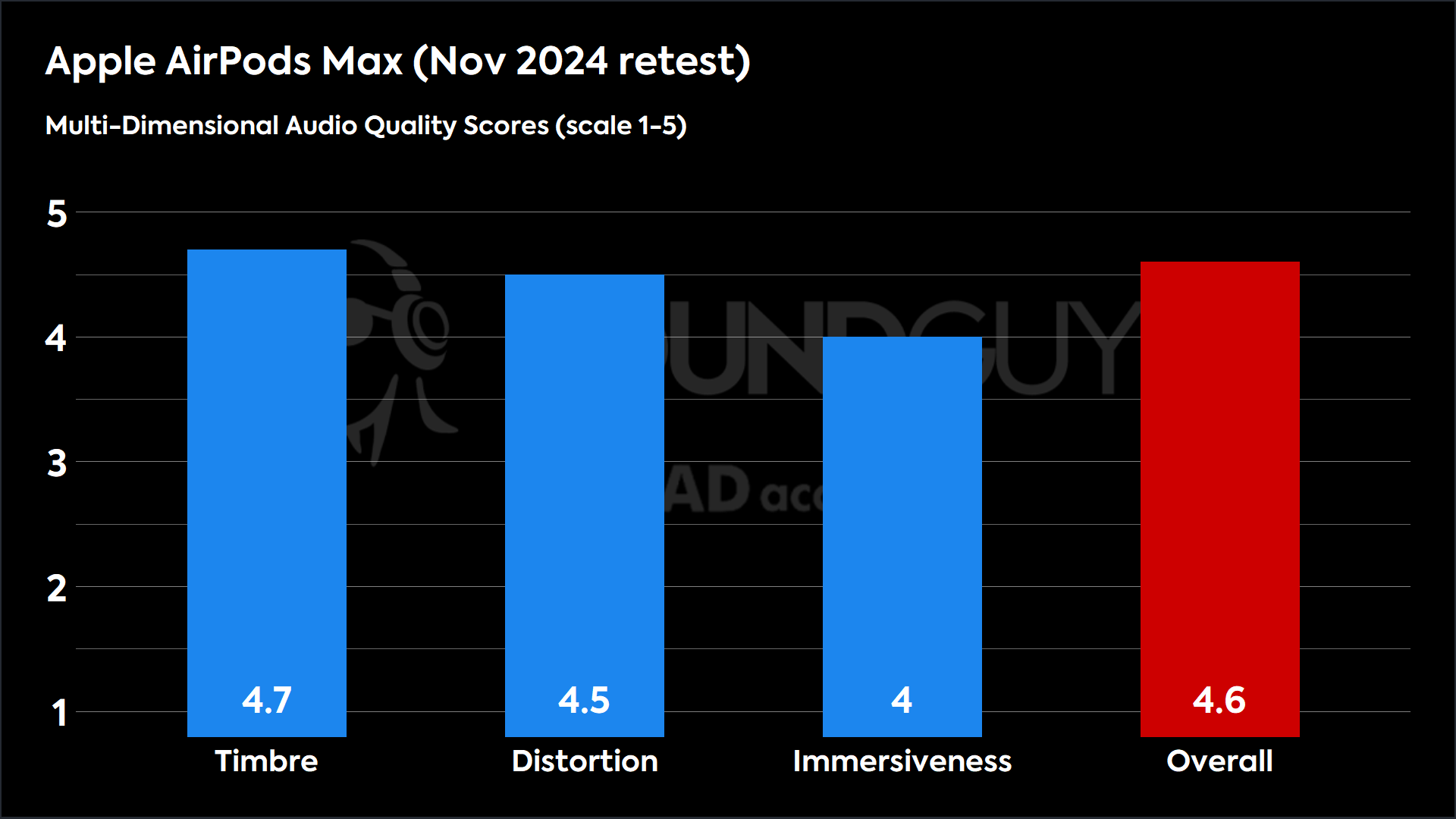
The simulated panel of listeners MDAQS represents rates the Apple AirPods Max fairly high across the board. However, this is very unusual, as most headphones will typically present with more displeasing noise, or worse immersiveness. Instead, the Apple AirPods Max present with very respectable scores without any notable deficiency. The likelihood that you would be displeased by the default sound is quite low.
- Timbre (MOS-T) represents how faithfully the earbuds reproduce the frequency spectrum and temporal resolution (timing information).
- Distortion (MOS-D) represents non-linearities and added noise: higher scores mean cleaner reproduction.
- Immersiveness (MOS-I) represents perceived source width and positioning: how well virtual sound sources are defined in three-dimensional space.
See here for a detailed explanation of what MDAQS is, how it works, and how it was developed.
Reviewer’s notes
The AirPods Max sounds really good and has a clear, pleasing sound profile that will appeal to most listeners. Among the options available for over-ear ANC headphones, these are among the best options on the market.
You likely won’t use this as a pair of studio headphones, but the extra volume in the low end makes these a little friendlier to most genres of music. You can really hear this in the song Sunday Vibes by Masego. At around the 0:40 mark, the sub-bass kicks in, and it’s strong enough to feel a slight vibration in the ear cups on moderate volume but not so strong that it masks the saxophone throughout.
Typically, I expect to hear some harshness at higher volumes, but the highs never become overwhelming or unpleasant. I don’t see many people taking issue with how the AirPods Max sounds for that reason. This isn’t bass-heavy, but the bass sounds good. The midrange comes across as nice and clear, and the highs aren’t piercingly loud.
Objective measurements
Loading chart ...
The measured frequency response curve for the AirPods Max follows our headphone preference curve fairly closely, with a notably reduced emphasis in the highs and little extra kick in the very low-frequency sub-bass region. The vocals are still plenty clear, as with the song Longing For Your Love by Ady Suleiman, whose voice remained present throughout even as more and more instruments began coming in. Of course, a lot of this has to do with the mix of the particular track.
The Apple AirPods Max doesn’t have any EQ presets. Instead, they use an adaptive EQ to automatically adjust their sound based on the particular shape of your ears and the seal on your head. Additionally, you can’t turn off the Adaptive EQ unless you turn off ANC or Ambient mode as well.
Can you use the AirPods Max wired?
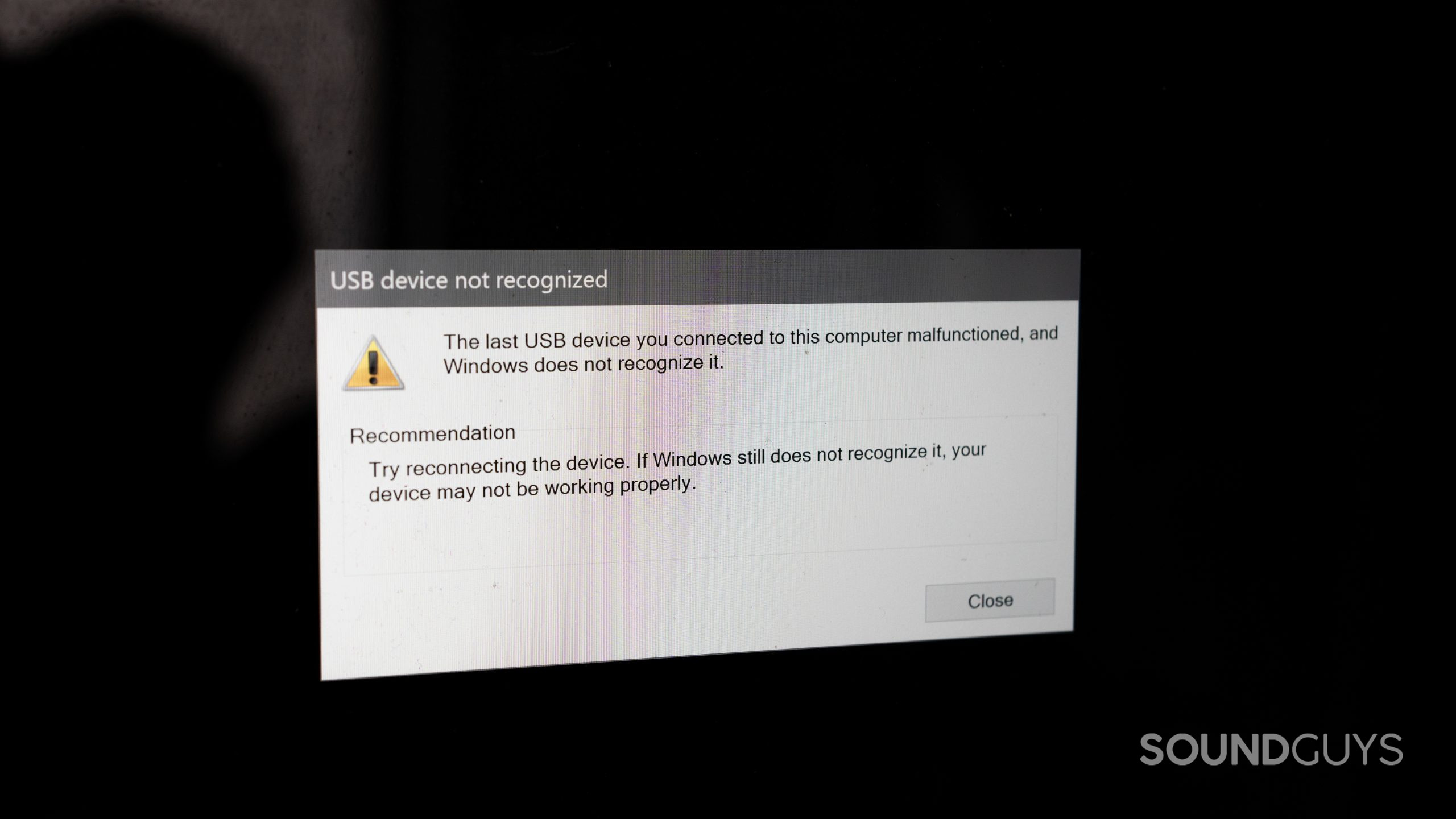
The AirPods Max lacks a 3.5mm headphone jack, but you can still use them wired. If you have the Lightning version of the AirPods Max, you need to buy the Lightning-to-3.5mm audio cable from Apple, which currently sells for $35. You’ll need another adaptor to get the audio out of your iOS device. This means taking the digital output from your device, converting it to analog, and then back to digital again in an awkward chain of pricey adaptors. There is no way to drive the AirPods Max with an all-digital wired connection. Given the overall quality of the headphones, this might be the biggest facepalm for those interested in preserving quality for high-resolution audio playback.
We have yet to test the AirPods Max with USB-C over a wired connection, but will update this section as soon as we test it.
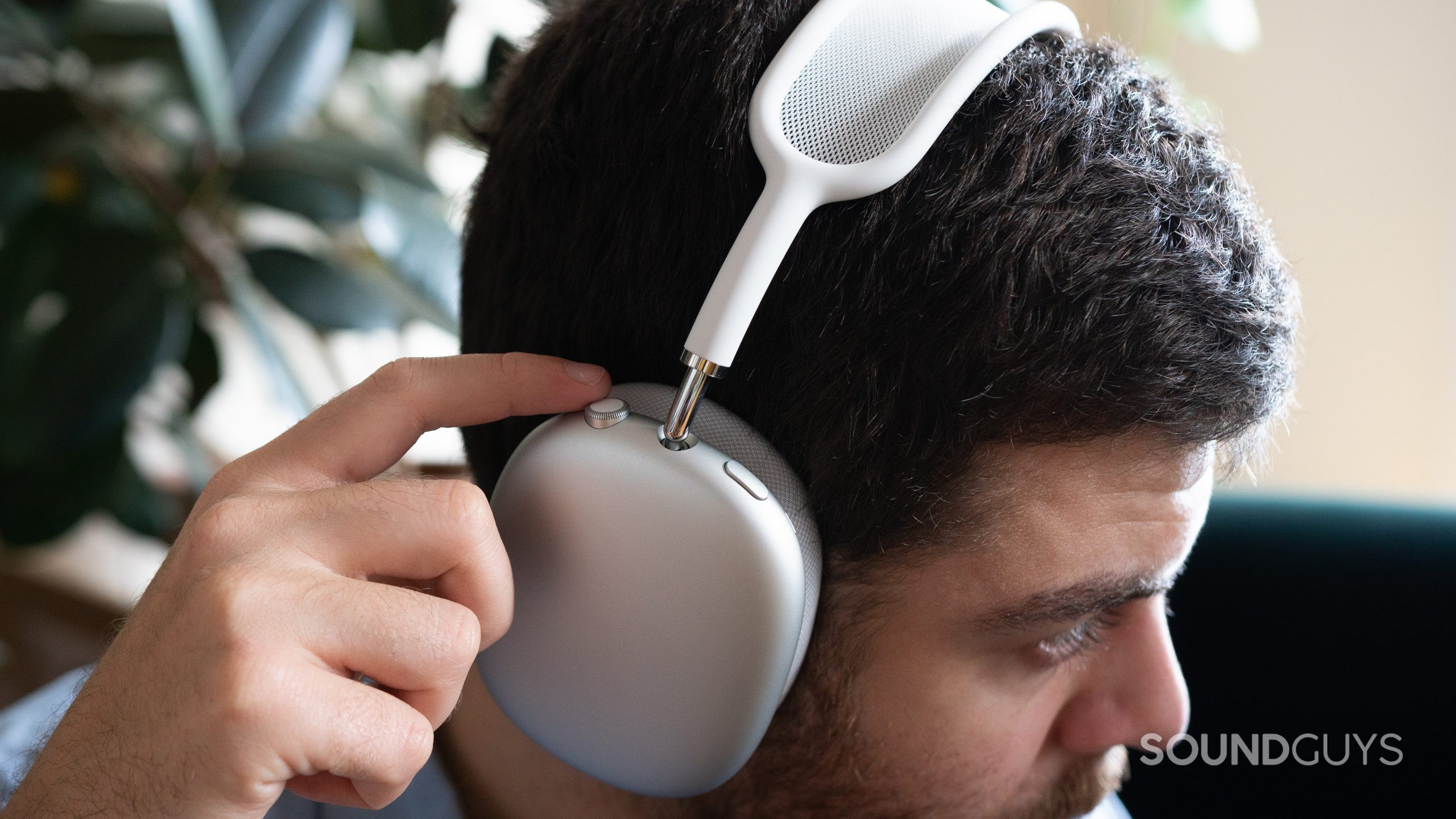
The Apple AirPods Max don’t offer the maximum benefit of lossless audio. However, you can get pretty close if you use the lightning dongle with a cable to connect the headphones.
The Apple AirPods Max doesn't support the highest quality audio from Apple Music.
In this scenario, you’re converting a digital signal into an analog one and then back into a digital signal … which then gets re-converted back into an analog one inside the headphones to send to the speaker drivers. You’ll probably not notice any hit to audio quality. Still, there’s always the risk that additional conversion stages in the audio path might introduce some distortion, noise, or loss of detail.
If you’re listening over Bluetooth, you’re not getting lossless audio. Even though Apple’s AAC implementation is excellent, the limitations of the wireless tech mean that you’re listening to an intelligently data-compressed signal when you use Bluetooth. While Apple Music features like spatial audio will work, lossless is not something you’ll need to worry about, so consider dropping the quality settings to save on energy and data if you’re listening to your AirPods Max wirelessly.
Does the AirPods Max have a good microphone?
Here’s where things get especially sticky. You may have seen a few videos on YouTube referencing our 2018 deep-dive into Bluetooth audio quality, which mentions how some devices tend to make weird choices with their processing. This is very apparent with the AirPods Max.
Though playback audio quality is pretty good no matter what source you use, for whatever reason, the same can’t be said about the microphone. It’s not always predictable which device will sound bad, but it’s easy to know which devices will work best with the AirPods Max: Apple devices. Below, we’ve highlighted some extreme examples. It should be stressed here that sound quality loss is dependent almost entirely upon your device’s handling of wireless communication.
The microphone quality is not great if you have the wrong device, but it’s not always clear which devices the “wrong” ones will be. That’s because it’s not entirely the headphones’ fault—it’s just that some devices have different defaults and settings when it handle data from the AirPods Max itself. For best results, always use a flagship Android or Apple device.
Apple AirPods Max microphone demo (ideal):
Apple AirPods Max microphone demo (office):
Apple AirPods Max microphone demo (street):
Apple AirPods Max microphone demo (wind):
How does the microphone sound to you?
Is the AirPods Max worth it?
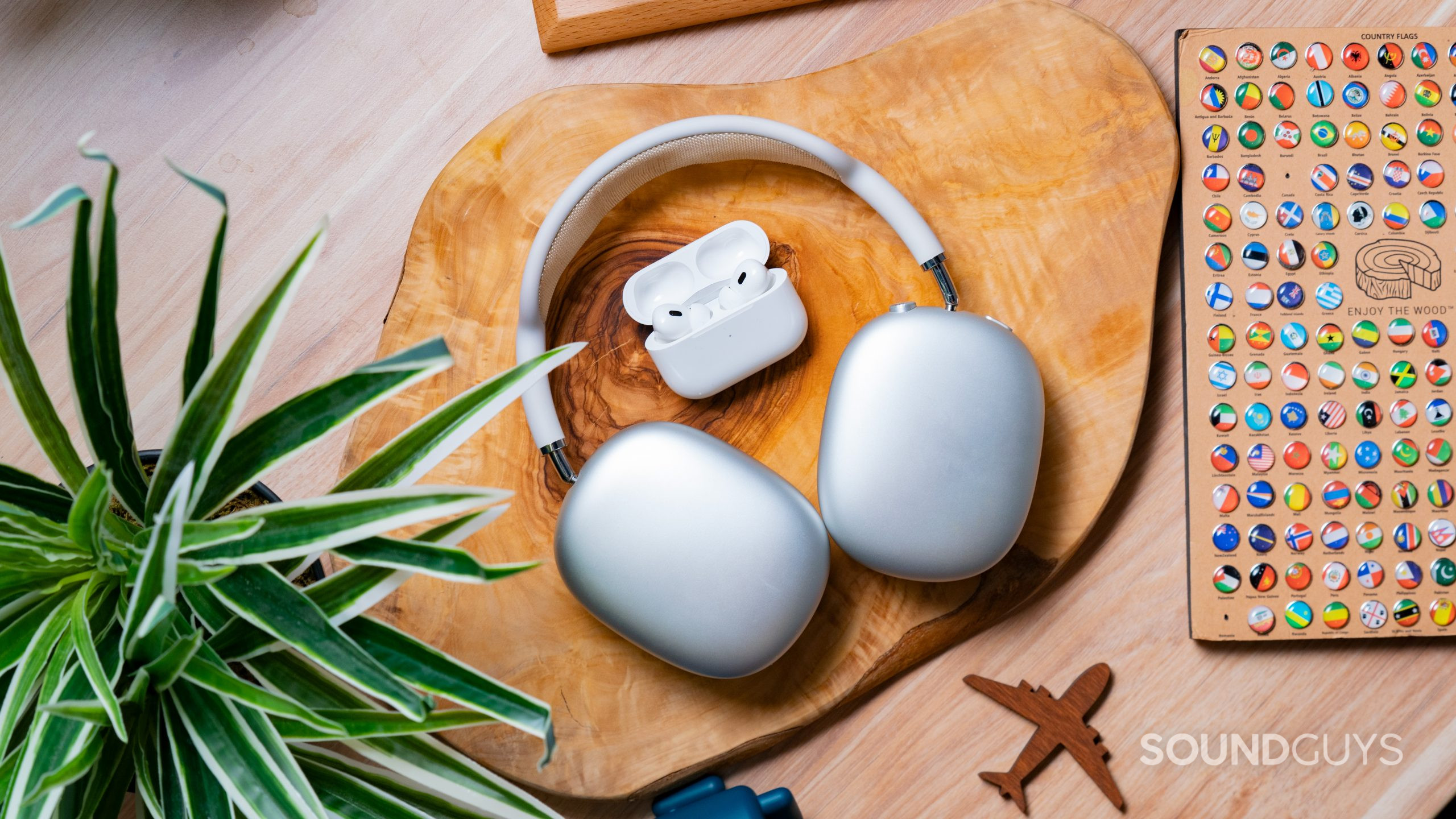
Whether or not you should spend around $549 on a pair of headphones is your call. Objectively, however, the AirPods Max is a spectacular pair of headphones. I appreciate smart features like auto-pause and the transparency mode, which are super practical. It also sounds great, is well-built, and has solid battery life. However, this doesn’t exist in a vacuum, and to get the most out of it, you need to commit to the Apple ecosystem.
The AirPods Max is the best noise canceling headset out right now, but it’s not the easiest to use or even the most comfortable. The lack of a headphone jack is frustrating, and the “smart” case … isn’t. If none of that bothers you, you’ll love the AirPods Max. If you’re not sure this is for you, it probably isn’t. To answer the question we started with, yes, the AirPods Max is overpriced—it’s also a great pair of headphones.


What should you get instead of the AirPods Max?
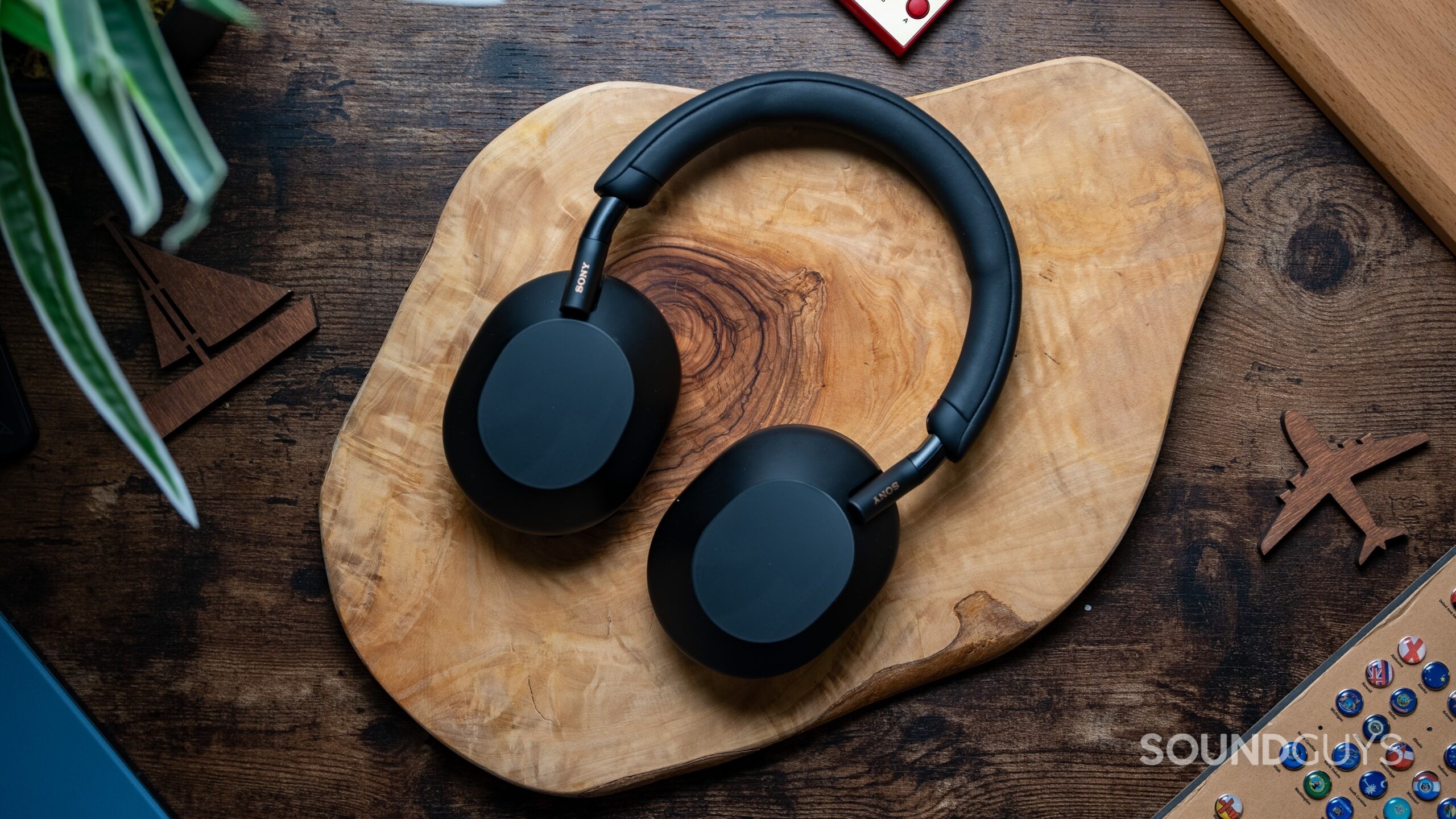
For the price of one pair of Apple AirPods Max, you can get a pair of truly great-sounding open-back headphones that will make your audiophile friends jealous. Similarly, you can get either the Sony WH-1000XM5 ($387 at Amazon) or the Bose QuietComfort Ultra ($429 at Amazon) and still have the cash to spare.
If you are an Android user with a newer phone, the Bose QuietComfort Ultra is the better buy due to its Qualcomm-exclusive features and comparable noise canceling. Whether or not you have iOS or Android, the Sony WH-1000XM5 is a great buy with features like speak-to-chat, Sony 360 Audio, multipoint, and the ability to change your EQ to your liking.
While the AirPods Max is a different form factor from the AirPods Pro, if you’re looking for headphones that perfectly integrate with iOS, you might be stuck between the two. If this is the case, check out our Apple AirPods Max vs Apple AirPods Pro (2nd generation) comparison to learn more.
Lastly, the AirPods Max 2 has been rumored for a while and could arrive as soon as this fall, so you may want to hold off until the next-generation model officially launches.
Frequently asked questions about the Apple AirPods Max
If you already have AirPods Max, you do not need to upgrade to the 2024 version that has USB-C. The change is charging port is the only notable difference between the two models.
Check out our short video below to help see if the AirPods Max are worth it for you. While the video was made in 2022, many of the same concerns are still relevant in 2024.
Undoubtedly, Apple will release the AirPods Max 2, which could be sooner than you think. Here is everything we know and want to see.
Loading chart ...
Loading chart ...
If you compare the AirPods Max to the Sony WH-1000XM4 noise canceling graph, you’ll see that the AirPods Max outperforms Sony’s ANC in this crucial part of the frequency range. Where the Sony WH-1000XM4 noise reduction slopes off below the 150Hz mark, the AirPods Max holds steady, meaning they are more effective at canceling the lowest frequency noises. While the Sony headset is great, the AirPods Max is just slightly better.
With the tvOS 15 operating system, Apple’s streaming box added spatial audio support for the AirPods Max, as well as easy switching to AirPods Max for private listening. Spatial audio support means the AirPods Max (and AirPods Pro) now support three-dimensional sound. It also supports dynamic head tracking, so if you move your head, the audio will adjust accordingly for a more realistic experience—turn away from the screen, and it’ll still sound like it’s coming from the TV.
There sure are! In fact, there are better-sounding headphones at less than the list price of Apple AirPods Max. We have a whole article on this.
If you have a bit of time, we recommend you check out our full list of the best AirPods Max alternatives. Our top recommendation for most people is the Sony WH-1000XM5: this headset is feature-packed and sounds great by default.
For one, it’s Apple, and most products under the brand name are overpriced. Still, they are a great pair of headphones with premium features that work well with iOS. But there are far better bang-for-your-buck options out there.
Like most wireless headphones, the AirPods Max should last between 3-5 years. The lithium-ion battery tends to be the first thing that goes bad.
Yes. Apple provides a battery service for the AirPods Max, although it comes with a service fee. However, if you have AppleCare+ and the battery holds less than 80% of its original capacity, you might be eligible for a battery replacement at no additional cost
Comparing the two headsets, both cancel out similarly impressive amounts of low-frequency noise to below 100Hz. While both are good choices for canceling out low, droning noises, the Airpods Max wins out in the mid-range, but the Sony WH-1000XM5 does a better job at handling high-range sounds due to better isolation. The difference here is not worth the higher price alone.
Apple sells AirPods Max in five colors: Space Gray, Silver, Sky Blue, Green, and Pink.
You can use the AirPods Max on an airplane when connected via Bluetooth to your mobile device. The AirPods Max will likely not work with an airplane’s infotainment system since it does not have a headphone jack and only uses a lightning cable for wired connections.